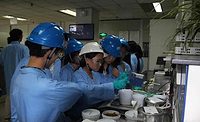PPG Holds ‘Eco Classroom’ Open Day at Three Chinese Sites

TIANJIN, China – PPG Industries’ coatings and resin plants in Tianjin, Zhangjiagang and Wuhu, China, held “Better Chemistry, Better Home” open days to celebrate World Environment Day. The open days encouraged neighbors in the plant communities to engage in environmental protection. During the events, students from local high schools and universities visited PPG’s facilities and Eco Classroom, which promoted sustainable development through a range of different activities.
“In addition to pursuing sustainable business growth, PPG is committed to promoting sustainability by protecting and improving the environment of communities where we have operations,” said John Richter, PPG Vice President of Operations, Coatings, Asia Pacific. “We treat the open day event as an opportunity to showcase our efforts to achieve our sustainability goals, and this year our Wuhu plant joined the Zhangjiagang and Tianjin plants in holding an ‘Eco Classroom’ open day. We plan to roll out this event to more PPG facilities in the future to promote PPG’s values to a wider audience.”
The Tianjin plant, PPG’s largest coatings production facility globally, was the first PPG site to hold an “Eco Classroom” open day event in China. This year, the plant invited more than 50 students majoring in chemistry and material science at Tianjin University, Nankai University and Beihang University to attend the open day. In addition to lectures and discussions with PPG staff on environmental protection, students participated in a tour of the Tianjin automotive OEM coatings development and application center and saw PPG’s innovative VOC treatment equipment.
The Zhangjiagang plant is PPG's first manufacturing site for resin in Asia and a model plant for eco-friendly practices. The plant held its open day event with two other companies in the Zhangjiagang Free Trade Zone. Thirty students from Chongzhen Middle School visited the plant and learned of PPG’s industry-leading manufacturing and environmental protection practices.
At its first open day event, PPG’s Wuhu plant invited local government officials and 15 students from Nanjing Tech University and 30 students from local high schools to participate in “Eco Classroom” activities. PPG volunteers explained how the company helps protect the environment with “green” production facilities, pollution reduction practices and innovative products and technologies. Students majoring in chemistry at Nanjing Tech University shared their views with high school students on environmental topics such as smog and food safety. They also visited the laboratories in the Wuhu plant. At the event, government officials from Wuhu Economic and Technological Development Zone applauded PPG for its efforts to promote eco-protection knowledge to citizens in Wuhu and engage the public in the endeavor of environmental protection. In order to beautify the environment in the city, they would like to extend such innovative events to more enterprises in future.
“The ‘Eco Classroom’ is an innovative platform that PPG initiated to communicate our sustainability efforts to the public. As one opportunity to fulfill our social responsibility, the event enables us to strengthen ties with neighbors in nearby communities, particularly students from local schools, and teach them more about what PPG does,” said Cathy Yan, PPG General Manager, Corporate and Government Affairs, Asia Pacific. “We hope their experience visiting PPG will help these students decide to study science, technology, engineering and math-related disciplines at university and choose jobs in technical and sustainability-oriented fields in the future.”
As a member of the Association of International Chemical Manufacturers (AICM), PPG organizes “Eco Classroom” open day events regularly in response to AICM’s call for sustainable development. It takes the opportunity to share its achievements and successes in sustainable development with the public during these events. To help support the sustainable growth of society, PPG and the other 24 member companies of the AICM signed the Responsible Care Beijing Manifesto in 2008.
Looking for a reprint of this article?
From high-res PDFs to custom plaques, order your copy today!









